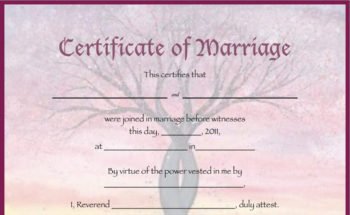Introduction: Special Marriage Act
Special Marriage Act: In India, all marriages can either be registered under the respective personal law (Hindu Marriage Act, 1955/Muslim Marriage Act, 1954) or under the Special Marriage Act, 1954. A marriage under the Special Marriage Act, 1954 allows people from two different religious backgrounds to come together in the bond of marriage. Unlike the personal laws, the applicability of the Special Marriage Act extends to all citizens of India irrespective of their religion. Though the marriage laws under the personal laws allow only for the registration of an already solemnized marriage, the Special Marriage Act provides for both solemnizations as well as legal registration. Special Marriage Act has carved a simple means to legally register a marriage between two people from different religion, however even if both of the intending parties belong to the same religion, they can choose to register the marriage under this Act. Here is a stepwise procedure to apply for a Special Marriage Act in India
Step-1: Eligibility Check
Before applying for the Special Marriage Act, make sure you fulfil all the given eligibility criteria:
- Both the intending parties must be a citizen of India.
- Neither of the parties must be having a living spouse at the time of marriage. In the case where either or both of the parties were involved in an earlier marriage, it is essential that the earlier marriage must be legally dissolved before applying under this Act.
- Both the parties must be in a capacity to give free and full consent to the marriage.
- The intending parties must comply with the age limit given under this Act. The female should at least be of eighteen years at the time of applying for marriage and the male must have completed the age of twenty-one.
- The Act prohibits solemnization of marriage if the intending parties fall within the degree of prohibited relationships, as per the customs governing any one of the parties. The degrees of prohibited relationship differs from custom to custom. The First Schedule of the Act does provide for an extensive list of relationships that may be considered to be prohibited. However, the rule is that where a custom governing at least one of the parties allows marriage as intended, it may be solemnized.
Step-2: Reach out to the concerned Marriage Officer
The Jurisdiction of the district can be invoked in which either of the two parties has a permanent residence (must be living there for at least 30 days before the submission of the said notice). In order to apply, reach out the Marriage Officer of the district so chosen (either the intending husband or the intending wife resides). The application should be in writing as per the format laid down in the Second Schedule. The format is also laid down below for reference:
NOTICE OF INTENDED MARRIAGE
To Marriage Officer for the ………………….District. We hereby give you notice that a marriage under the Special Marriage Act, 1954, is intended to be solemnized between us within three calendar months from the date hereof.
A, B. Unmarried
Widower
Divorcee
C.D. Unmarried
Widow
Divorcee
Witness our hands this …………………………………………..day of ………………….19.
(S.d.) A.B. (S.d.) C.D.
Step-3: Public Notice and Objections
Once the Marriage Officer has received such an application, duly signed by both the parties, the Officer shall then release a public notice with a period of thirty-days to raise objections to the intended marriage if any. The objections generally are relating to non-fulfilment of the conditions mentioned in Section-4 of the Act (also mentioned in Step-1). If the conditions are duly fulfilled and no such objections are raised, it should enter a certificate of the marriage in the Marriage Certificate Book. Here, the signatures of both the intending parties as well as the witnesses are required.
After having completed all the above steps, the marriage under this Act can be said to be duly solemnized and registered.
Please note that along with three witnesses required at the day of solemnization, you might also require certain documents.
Here, an illustrative list has been provided:
- Proof of Age
- Address Proof
- Affidavit with regard to Marital Status
- Non-Relationship between the parties within the degree of prohibition.
- Passport size Photos.
Click Here to Download
ALSO READ:

